What's Happening?
A coalition of labor unions, healthcare providers, academic groups, religious organizations, and individual visa holders has filed a lawsuit against the Trump administration, challenging a new $100,000 fee imposed on H-1B visa workers. The fee, introduced by a proclamation from the White House on September 19, 2025, has caused significant concern among employers and workers, particularly those in the tech industry who heavily rely on these visas. The lawsuit, filed in the US District Court for the Northern District of California, argues that the fee violates the Immigration and Nationality Act and the Administrative Procedure Act. The plaintiffs claim that the President lacks the authority to unilaterally impose such fees, which have disrupted the employment-based immigration system and caused immediate harm to those affected.
Why It's Important?
The imposition of the $100,000 fee on H-1B visa workers has significant implications for various sectors in the United States. Companies, schools, and other institutions that depend on the H-1B program are likely to face disruptions, potentially exacerbating shortages in critical areas such as teaching and nursing. The fee could also interfere with research at universities and hinder religious organizations from obtaining staff with necessary language skills and cultural knowledge. The lawsuit highlights the broader impact on the public interest, as the changes could affect the ability of U.S. businesses to attract and retain international talent, potentially influencing the country's competitive edge in the global market.
What's Next?
The lawsuit, titled Global Nurse Force v. Trump, is set to proceed in the Northern District of California. As the case unfolds, it could lead to further legal scrutiny of the Trump administration's immigration policies. The outcome may influence future administrative actions regarding visa regulations and fees. Stakeholders, including businesses and advocacy groups, are likely to monitor the case closely, as its resolution could have lasting effects on the U.S. immigration system and the economy. The administration's response and potential adjustments to the policy will be critical in determining the future landscape of employment-based immigration in the United States.
Beyond the Headlines
The legal challenge against the Trump administration's H-1B fee policy underscores the ongoing debate over immigration reform in the United States. The case raises questions about the balance of power between the executive branch and Congress in setting immigration policy. It also highlights the tension between protecting domestic labor markets and maintaining the country's status as a destination for global talent. The outcome of this lawsuit could set a precedent for how immigration policies are crafted and challenged in the future, potentially influencing the broader discourse on immigration and labor in the U.S.










